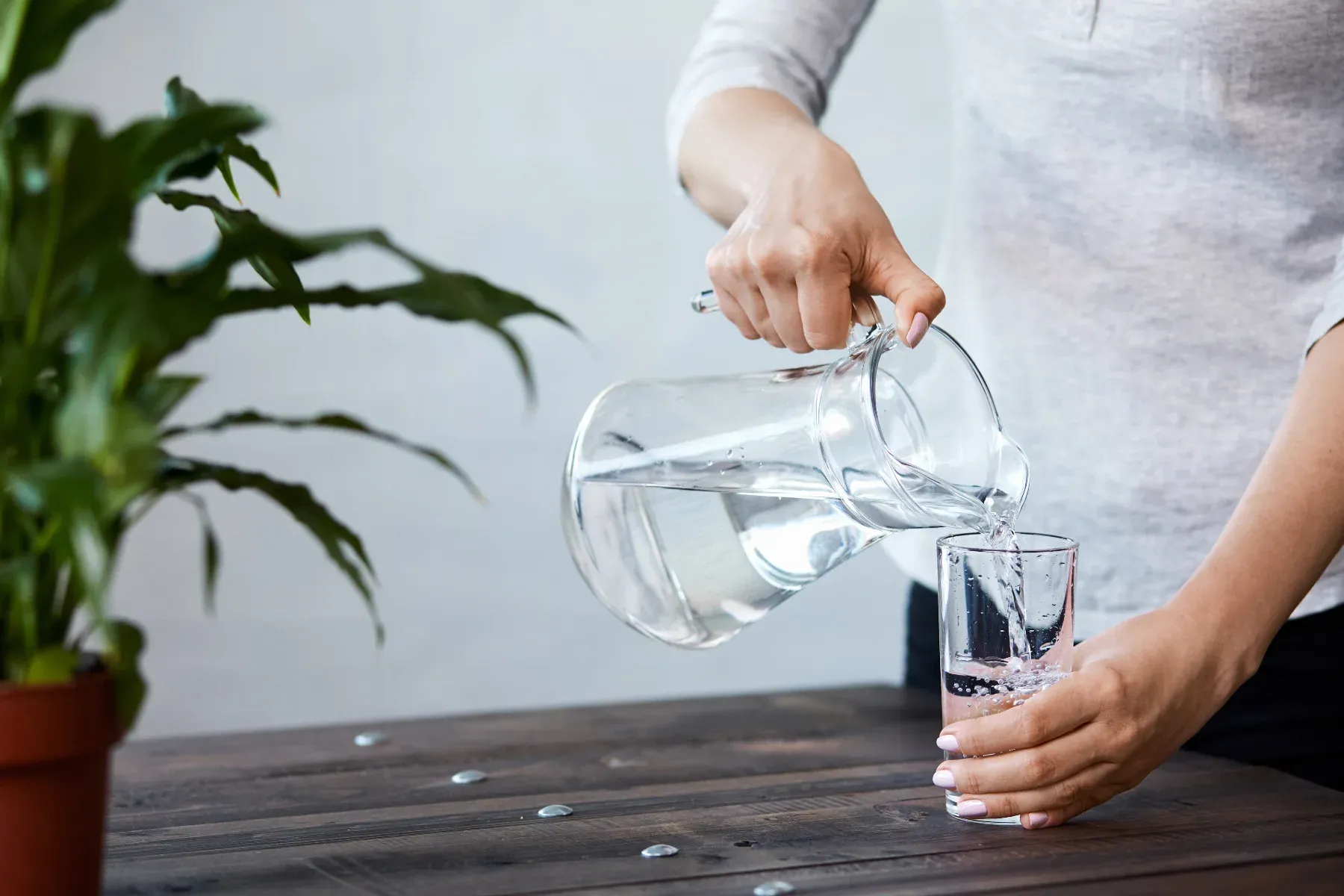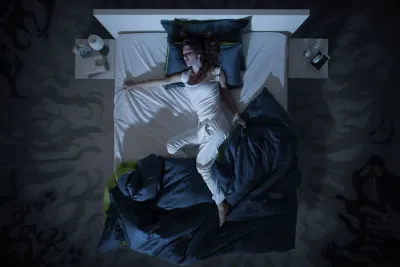Drinking Water Before Bed: Benefits, Risks, and Best Practices
Chilipad Editorial Team • Sep 11, 2025

Key Takeaways
Staying hydrated matters, but when you drink water can influence how well you sleep.
- Proper hydration supports overall health, but drinking large amounts of water right before bed can interrupt sleep.
- Late-night fluid intake may increase nocturia, leading to more nighttime bathroom trips and fragmented sleep.
- Meeting most of your hydration needs earlier in the day and tapering off fluids 1–2 hours before bedtime can help protect sleep quality.
- Balanced hydration supports digestion, joint comfort, and body temperature regulation, all of which play a role in better sleep.
The glass of water on your nightstand represents one of sleep’s most common dilemmas. You’re thirsty, but you’re also worried about waking up multiple times during the night for bathroom trips. This nightly decision affects millions of people who struggle to balance their body’s hydration needs with the desire for uninterrupted sleep.
The question of whether you should drink water before bed doesn’t have a simple yes or no answer. While proper hydration supports numerous bodily functions that continue overnight, timing and quantity matter significantly for maintaining sleep quality.
Understanding the science behind bedtime hydration can help you make informed decisions that support both your overall health and your sleep.
Drinking Water Before Bed
The debate surrounding drinking water before bed centers on balancing your body’s overnight hydration needs with the requirement for uninterrupted sleep. Even while you sleep, your body loses water through breathing, sweating, and small amounts of urine, so staying hydrated is still key to keeping things running smoothly.
Research shows that moderate water intake before bed can support hydration, metabolic processes, and mental state when timed correctly. [1] However, drinking too much close to bedtime for some individuals can increase the risk of nocturia - waking at night to urinate. This can significantly disrupt your sleep cycle and negatively impact your overall sleep quality.
Whether or not it’s a good idea to drink water before bed depends on a mix of personal factors, including your body, habits, and health.
Personal Factors Include:
- Age Considerations: Elderly individuals have less efficient kidneys, reduced bladder capacity, and are more prone to nighttime urination. As we age, our bodies become less capable of concentrating urine overnight, making timing even more critical.
- Medical Conditions: People with diabetes, kidney disease, or prostate enlargement face increased risks of frequent nighttime urination. These conditions can make even small amounts of evening fluid intake problematic for sleep quality.
- Medications: Diuretics, antihistamines, and certain blood pressure medications can affect both urination frequency and nighttime thirst, requiring personalized approaches to evening hydration.
Pair Your Nighttime Routine with Chilipad
Whether you drink water or not, pairing your bedtime routine with the Chilipad cooling mattress topper helps you sleep cooler, deeper, and better throughout the night.
The Benefits of Drinking Water Before Bed
Most people think that drinking water at night means going to the bathroom more often, but it’s not always a bad move. Staying hydrated before bed can actually support a bunch of behind-the-scenes processes your body keeps running while you sleep.
Just because you’re off the clock doesn’t mean your body is, hydration powers everything from overnight cell repair to internal temperature control while you sleep.
We’ve included some great health benefits below that might just change how you think about that pre-bed glass of water.
Note: The general recommendation is to drink eight glasses of water a day to stay hydrated. [2]
Preventing Nighttime Dehydration
Waking up with a dry mouth, scratchy throat, or headache? You might be dehydrated. Even while you sleep, your body loses water, which can affect sleep quality and leave you feeling groggy in the morning.
Staying hydrated before bed helps your body regulate temperature, breathe easier, and sleep more deeply. It even keeps your airways moist, great news if you snore or sleep with your mouth open.
Research from Nutrition Reviews supports this claim: a little hydration before bed can lead to fewer wake-ups, fewer muscle cramps, and a better mood in the morning. [3] We've all got enough to deal with—don’t let dehydration add to the list.
Supporting Brain Health and Cognitive Function
Your brain doesn’t clock out when you do. It’s busy filing memories, regulating mood, and clearing out waste while you sleep. And guess what keeps all that running smoothly? Hydration.
Even mild dehydration can disrupt things, affecting your mood, interfering with your sleep cycle, and making it harder for your brain to form memories. A 2014 study found that low fluid levels can negatively impact emotional balance, focus, and sleep quality. [4]
On the other hand, staying hydrated, especially before bed, can enhance clarity, improve your mood, and support your brain's overnight housekeeping. That includes flushing out toxins, balancing neurotransmitters, and keeping those cognitive gears turning efficiently. So, your brain sleeps better when it’s well-watered.
Enhancing Skin Health and Appearance
Your skin gets to work while you sleep—repairing damage, building fresh cells, and recovering from everything the day threw at it. And just like the rest of your body, it needs water to function properly.
Staying hydrated before bed helps your skin stay elastic, balanced, and ready to regenerate. When you’re well-hydrated, skin cells can better repair themselves overnight, resulting in a healthier, more refreshed appearance over time.
Dehydration, even overnight, can accelerate the appearance of fine lines and leave your skin looking dry and flaky. While research on the exact effects of nighttime hydration is still catching up, dermatologists widely agree - staying hydrated supports smoother and healthier skin.
Natural Detoxification
Your kidneys don’t take a break while you sleep, they’re hard at work filtering your blood, balancing electrolytes, and flushing out toxins. They need proper hydration to do all that efficiently.
When you drink water, it helps both your kidneys and liver process and clear out metabolic waste without unnecessary strain. When you’re well-hydrated, your body can concentrate urine more effectively and detox like it’s supposed to.
Hydration also keeps your lymphatic system running smoothly. That means improved circulation, immune support, and waste removal while you sleep, which contribute to a healthier body and a more refreshed feeling upon waking.
Potential Drawbacks and Risks
Drinking water before bed has its perks, but timing and how much you drink matter. Knowing the risks helps you fine-tune your nighttime routine for better sleep, not bathroom runs.
Related: Thinking about getting a Chilipad? Check out the key questions to consider so you can find out if it’s the right sleep upgrade for you.
Sleep Disruption from Nocturia
Frequent bathroom trips during the night represent the primary concern with drinking water before bed. Nocturia disrupts your natural sleep cycle, particularly affecting REM sleep and deep sleep stages that are crucial for memory consolidation and immune system function.
It is more common than you think. Approximately 1 in 3 adults over 30, and more than 50% of adults over 65, report waking up at least once a night to use the bathroom. [5] For many, this represents a significant barrier to achieving a good night’s sleep and maintaining a regular sleep schedule.
Once you’re up, getting back to sleep can be tough. These interruptions fragment your sleep architecture, reducing the time spent in restorative sleep phases. Over time, chronic sleep disruption from frequent urination can lead to increased daytime fatigue, difficulty concentrating, and a greater risk for depression and cardiovascular issues.
The impact extends beyond just feeling tired the next day. Disrupted sleep patterns can affect your overall health, and mental performance, and even contribute to weight gain over time.
Overhydration Concerns
Yes, too much of a good thing, like water, can backfire, especially before bed. Consuming large amounts late at night doesn’t just mean more bathroom trips; it can throw off your electrolyte balance and, in rare cases, lead to hyponatremia (low sodium levels), particularly if your kidneys aren’t functioning at full strength.
If you’re going to the bathroom nonstop, your urine looks like water, or you feel bloated or foggy, you might be overhydrating. While true water toxicity is rare in healthy adults, downing liters before lights out can do more harm than good.
Most experts recommend 4–8 ounces (approximately 120–240 ml) before bed as sufficient. More than that may not help, and could seriously disrupt your sleep. If you’re taking medications such as diuretics or have kidney issues, consult your doctor for personalized hydration advice.
Drinking Warm vs. Cold Water: Which Is Better Before Bed?
Believe it or not, the temperature of your water can impact how your body winds down for sleep. Both warm and cold water have their benefits, but they impact your digestion and bedtime routine in distinct ways.
Drinking Warm Water
Drinking warm water before bed can promote relaxation and help signal to your body that it’s time to wind down. The gentle heat may induce a calming effect that supports your transition into sleep mode, making it easier to fall asleep naturally.
Got a sore throat or stuffy nose? Drinking warm water can also relieve congestion and make breathing easier. While the detox claims are still up for debate, warm water does boost circulation, which supports your body as it recharges overnight.
Drinking Cold Water
Cold water may have a stimulating effect that can interfere with the body’s natural wind-down process, potentially making it more difficult to fall asleep.
However, in warmer climates or during a fever, drinking water that is cold, can aid in cooling the body and improving comfort. In such cases, it may be more beneficial than drinking warm water.
Individuals with sensitive digestive systems may experience mild stomach discomfort when consuming cold water on an empty stomach compared to warm water.
For those unsure of their preference, room-temperature water offers a balanced alternative, minimizing digestive disruption without the stimulating effects of cold water or the need to heat it.

Finding the Right Balance: When and How Much Before Bed
Striking the right balance between staying hydrated and sleeping soundly comes down to timing and portion control. Experts suggest stop drinking fluids 1–2 hours before bed and sticking to a moderate amount, while recognizing that personal needs and tolerances may vary.
When to Stop Drinking Water
Experts generally recommend cutting off significant water intake 1–2 hours before bed. This gives your body time to process fluids and helps reduce nighttime bathroom trips that can interrupt your sleep.
People who stopped drinking water about 2 hours before sleep had fewer awakenings compared to those who drank closer to bedtime.
If you have a sensitive bladder or often wake up to urinate, consider stopping fluids up to 3 hours before bed for better results.
Of course, some exceptions apply. If you need small sips for medications or have specific hydration needs because of health conditions, exercise, or climate, it’s best to consult your healthcare provider for a personalized plan.
How Much Water Is Just Right?
Aim for 2–4 liters of water spread throughout the day, not loaded up at night. To stay hydrated without disrupting sleep, keep bedtime water to a modest 4–8 ounces (120–240 ml).
A quick hydration check? Your urine.
- Pale yellow = good.
- Dark yellow = drink more.
- Crystal clear = maybe too much water.
Activity level, climate, medications, and health conditions can all affect your needs—so adjust accordingly while keeping your evening intake in check.
Best Practices for Healthy Hydration
To stay well-hydrated and sleep soundly, you need more than just cutting off water before bed. The key is building smart hydration habits throughout the entire day.
Daytime Hydration Strategies
- Start Strong: Begin your day with a large glass of water to replenish overnight losses and jumpstart your metabolism.
- Sip Steadily: Keep a refillable water bottle with you to encourage consistent intake without needing to chug late at night.
- Eat Your Fluids: Yes, you read that right. Load up on water-rich foods like watermelon, cucumbers, oranges, and lettuce to boost hydration naturally.
- Hydrate Around Workouts: Drink before, during, and after exercise to replace sweat losses and avoid late-day dehydration.
Tip: Carry a water bottle with you and sip from it regularly.
Evening Preparation Tips
- Time Your Dinner Right: Eat at least 2–3 hours before bed to support digestion and reduce late-night thirst.
- Bathroom Break Before Bed: Always go—even if you don’t feel the urge—to reduce the risk of waking up during the night.
- Cool Your Room: Keep bedroom temps between 60–67°F (15–19°C) to minimize sweating and fluid loss overnight.
- Skip Sleep Disruptors: Avoid caffeine, sugary drinks, and alcohol in the evening—they can disrupt both sleep and hydration.
Tip: It's recommended that you should stop drinking water two hours before going to bed.
Special Considerations
- Medication Management: If you're taking diuretics or medications that affect fluid levels, consult your doctor about when and how much to drink.
- Chronic Health Conditions: Conditions like diabetes, kidney disease, or prostate issues require tailored hydration plans—medical advice is important.
- Older Adults: Age-related kidney and bladder changes make seniors more prone to nighttime disruptions; a more conservative evening intake may help.
- When to Seek Help: Talk to your healthcare provider if you wake up more than twice a night to urinate, feel thirsty despite drinking enough, or can’t find the right hydration-sleep balance.
Alternative Bedtime Beverages
If plain water isn’t your thing before bed, you're not out of options. Certain bedtime beverages can promote relaxation, support sleep quality, and still help with hydration—without the frequent wake-ups.
From herbal teas to magnesium-rich blends, the right drink can make all the difference. Want to explore your options?
Check out our guide to the best drinks that help you sleep.
Conclusion: Hydrate Smart, Sleep Smarter
Drinking water before bed isn’t a simple yes-or-no decision; it’s all about timing and how much you drink. Staying hydrated supports everything from your brain and skin to detox and digestion, even while you sleep.
But chugging a full glass right before your head hits the pillow? That’s a one-way ticket to sleep disruption.
The goal is balance: sip smart throughout the day, ease up in the evening, and give your body what it needs, without overloading it at night. Whether you prefer warm water, cool sips, or a soothing alternative drink, your hydration habits can make or break a good night’s rest.
Listen to your body, tweak your nighttime routine, and don’t be afraid to try what works best for you. A little strategy goes a long way toward better sleep and better mornings.
Frequently Asked Questions: Drinking Water Before Bed
Why Do I Get Thirsty Right Before Bed?
That pre-bed thirst isn’t something new. It’s often your body’s sleep-wake cycle doing its thing, influenced by everything from daytime dehydration to what you ate (or drank) and even certain medications.
Can Drinking Water before Bed Help with Weight Loss?
Having water before bed won’t magically burn fat, but staying hydrated can support your weight management goals. it can help with everything from appetite control to keeping your body running at peak efficiency.
Can Dehydration Cause Insomnia or Sleep Problems?
Yes. Dehydration can play a sneaky role in insomnia and other sleep disorders and issues. While it’s not usually the root cause, it can amplify problems by triggering symptoms that make it harder to fall asleep or stay asleep.
Ask ChatGPT
Is Drinking Water before Bed Good for the Heart?
A small glass of water before bed can help top up your fluids, keep your blood flowing smoothly, reduce viscosity, and give your cardiovascular and cerebrovascular systems a healthy boost.
Peer-Reviewed Research References
-
Qayyum, S., Iltaf, S., Sajjad, M., Azam, M.
Association of Sleep Patterns and Water Intake With Cognitive Functions in Adults in an Urban Environment.
Pakistan Journal of Medical Sciences, 2024.
Study Type: Observational Cross-Sectional Study
Key Finding: Found associations between sleep duration, hydration habits, and cognitive performance, suggesting that both sleep patterns and adequate water intake may support attention, memory, and mental clarity.
View Study
Source URL: https://pubmed.ncbi.nlm.nih.gov/38544990/
-
Valtin, H.
“Drink at Least Eight Glasses of Water a Day.” Really? Is There Scientific Evidence for “8 × 8”?
American Journal of Physiology – Regulatory, Integrative and Comparative Physiology, 2002.
Study Type: Scientific Review / Commentary
Key Insight: Challenges the universal “8×8” hydration rule, noting that hydration needs vary widely based on diet, activity level, and environment, and that thirst is generally a reliable guide for most healthy adults.
View Study
Source URL: https://pubmed.ncbi.nlm.nih.gov/12376390/
-
Lassi, Z.
Nutrition Reviews.
Oxford University Press (OUP Academic), 2025.
Source Type: Peer-Reviewed Nutrition Review Journal
Key Insight: Publishes evidence-based reviews on nutrition and hydration, including their effects on cognitive performance, metabolic health, and overall wellbeing.
View Resource
Source URL: https://academic.oup.com/nutritionreviews
-
Ganio, M.S., et al.
Mild Dehydration Impairs Cognitive Performance and Mood of Men.
British Journal of Nutrition, 2011.
Study Type: Controlled Laboratory Study
Key Finding: Found that even mild dehydration negatively affected mood, concentration, and cognitive performance, underscoring the importance of adequate hydration for mental function.
View Study
Source URL: https://pubmed.ncbi.nlm.nih.gov/21736786/
-
Leslie, S.W., et al.
Nocturia.
StatPearls Publishing, National Library of Medicine, 2024.
Source Type: Clinical Medical Reference
Key Insight: Reviews causes of nocturia, including fluid intake timing, sleep disorders, and medical conditions, highlighting how nighttime urination can disrupt sleep continuity and quality.
View Resource
Source URL: https://www.ncbi.nlm.nih.gov/books/NBK519521/









